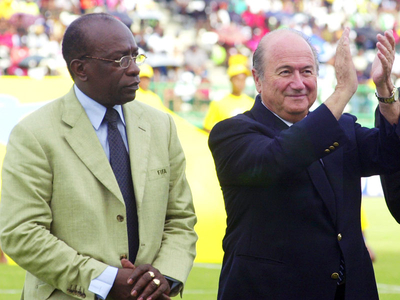By Andrew Warshaw
January 6 – A week after bombshell allegations by former powerbroker Jack Warner, FIFA have hit back in an escalation of the bitter war of words between the two parties.
Warner, who was FIFA’s senior vice-president until he walked away from football rather than face a potentially damning probe into his role in the infamous cash-for-votes scandal, claimed he was awarded World Cup television rights for as little as $1 (£0.65/€0.77) in exchange for helping the FIFA President, Sepp Blatter, win a number of election victories.
But FIFA have responded in a statement that accuses Warner of “several inaccuracies and falsehoods” as it put its side of the story.
FIFA confirmed that Warner received Caribbean broadcasting rights for $1 (£0.65/€0.77), though from 1986 and not – as Warner claimed – from 1998 when Blatter was first elected.
The issue of television rights, it said, “had nothing to do with the 1998 or 2002 election campaigns, or with any other election campaign.
“To imply the contrary is completely false.”
After what appeared to be detailed research into Warner’s allegations, FIFA said it had done nothing untoward in terms of dealing with the veteran Caribbean, referring back to an Executive Committee meeting held in Busan, South Korea on November 30, 2001.
It was there, they said, that Warner himself explained how he came to gain the rights for the 1986 World Cup – not the one 12 years later – “for a symbolic sum” of one dollar.
Warner told the meeting, FIFA said, that he had acquired the rights from the then FIFA vice-president Guillermo Cañedo.
“As is written in the minutes of that meeting, Jack Warner explained that he then resold the rights to the Caribbean Football Union (CFU), subsequently ploughing the money back into football development in the Caribbean area,” the statement said.
FIFA fiercely disputed Warner’s implication that he had gained the rights for a token fee in return for supporting Blatter. It said selling rights for a minimal cost was de rigueur and perfectly above board.
“Until 1998, TV rights were provided by the rights-holders for symbolic sums in many territories (for example in Africa), in order to maximise the worldwide television coverage … and also to support national associations and confederations with a source of revenue for football development,” FIFA said.
“In addition, FIFA has traditionally (and still does), established and applied globally an exploitation model according to which the worldwide TV rights for all FIFA World Cup qualifier matches are vested with such national association hosting the respective qualifying match.
“The income generated through this exploitation model is a major source of income for each national association and gives each national association the financial means for football development in each country.”
All decisions relating to World Cup rights, FIFA added, are discussed and approved by the relevant committees ahead of time.
“Jack Warner obtained the TV rights for the FIFA World Cup in the Caribbean, for the purpose of supporting football development in the CFU, already in 1986, and not 1998,” the FIFA statement said.
“Such rights were ceded in order to provide an additional source of revenue for football development in the CFU.
“TV rights for the 2002 FIFA World Cup in the Caribbean were approved by the FIFA Executive Committee at their November and December 2001 meetings, not after the 2002 elections.”
Contact the writer of this story at zib.l1734968098labto1734968098ofdlr1734968098owedi1734968098sni@w1734968098ahsra1734968098w.wer1734968098dna1734968098
Related stories
December 2011: Andrew Warshaw – Blatter needs to publicly respond to Warner’s allegations
December 2011: British MP demands investigation into FIFA chief Sepp Blatter
December 2011: Warner claims World Cup TV rights deal with Blatter
December 2011: Warner renews Blatter hostilities
November 2011: Warner forced to wait to find out if to be charged after bribery allegations

